-
Featured Topics
-
Topics
-
0
-
5
-
2
-
Cyber Akuma ·
Posted in CPUs, Motherboards, and Memory0 -
8
-
0
-
ave11 ·
Posted in Troubleshooting1 -
4
-
Abstrxction ·
Posted in Storage Devices3 -
3
-
-
play_circle_filled

Latest From GameLinked:
Are you excited for Doom: The Dark Ages? - Gamers 2 Gamers









.thumb.jpeg.6737daa6cb189c533b3609abafed6631.jpeg)






Create an account or sign in to comment
You need to be a member in order to leave a comment
Create an account
Sign up for a new account in our community. It's easy!
Register a new accountSign in
Already have an account? Sign in here.
Sign In Now